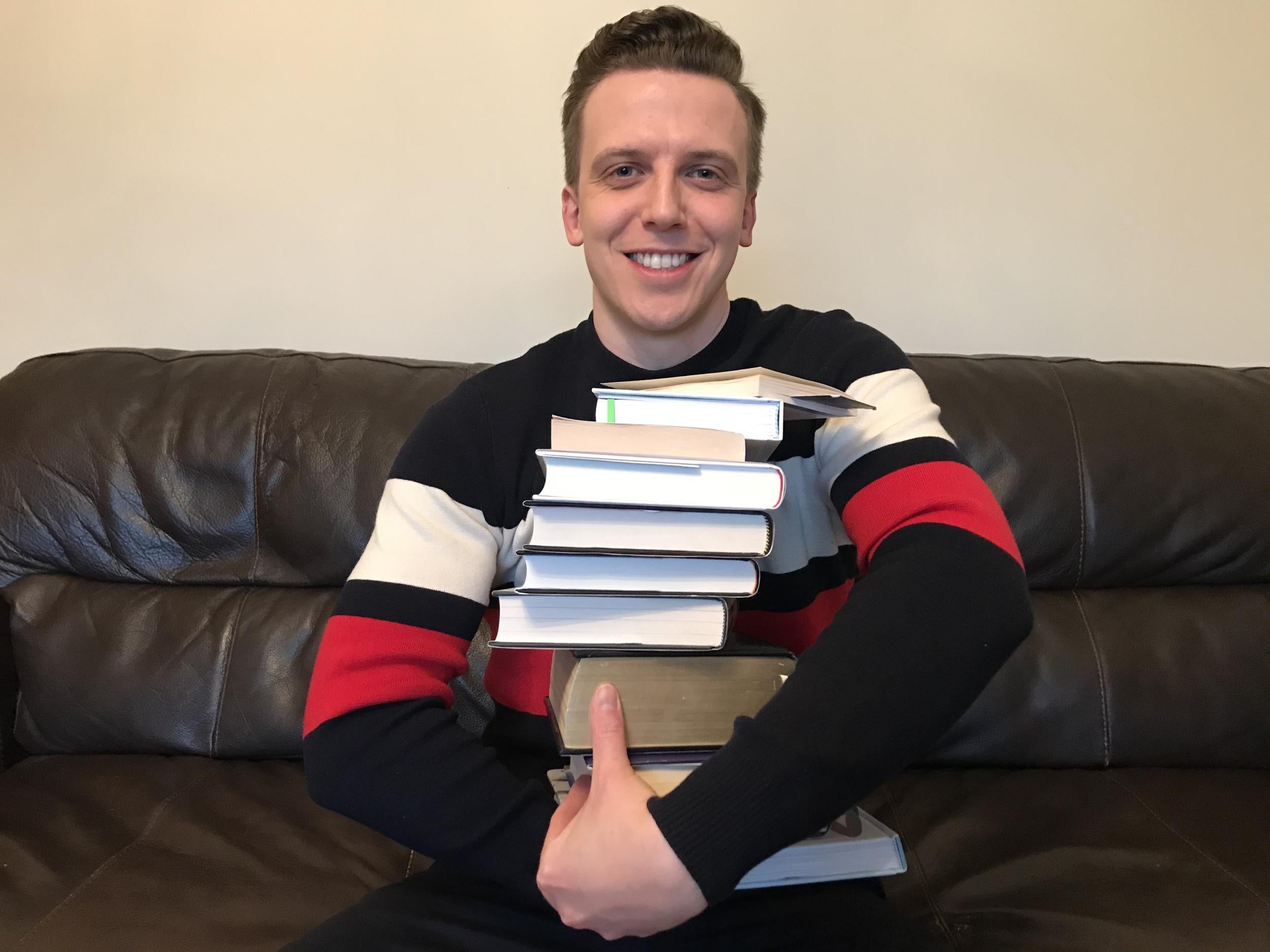Your support helps us to tell the story
From reproductive rights to climate change to Big Tech, The Independent is on the ground when the story is developing. Whether it's investigating the financials of Elon Musk's pro-Trump PAC or producing our latest documentary, 'The A Word', which shines a light on the American women fighting for reproductive rights, we know how important it is to parse out the facts from the messaging.
At such a critical moment in US history, we need reporters on the ground. Your donation allows us to keep sending journalists to speak to both sides of the story.
The Independent is trusted by Americans across the entire political spectrum. And unlike many other quality news outlets, we choose not to lock Americans out of our reporting and analysis with paywalls. We believe quality journalism should be available to everyone, paid for by those who can afford it.
Your support makes all the difference.I’ve just turned the page on my 52nd book of the year and completed my New Year’s Resolution for 2019 – to read one book every week.
OK, so some books actually took a little longer than a week, and others I finished in days, but if you cut me some slack I’ll let you in on how I managed to do this and still have time to work, eat and hold together something resembling a social life.
Build up to it
This whole 52 books in a year thing sounds pretty unachievable, and it felt a bit like that when I started in January, but I did work my way up to this target.
I love to read – I always have – and despite doing an English degree, I’ve always felt like quite a slow reader. When I got a job at The Independent, which required a fair old commute, I started reading more frequently, and found that like some sort of biblio-athlete, I was slowly learning to read faster, and take in trickier texts and subjects. I read 21 books in 2017, which I realised was almost two a month – so I made that my target for 2018. Then in 2018 I actually managed 36, which was three a month. So that’s when four in a month sounded achievable.
Read wherever and whenever you can
The hardest thing about lots of reading is finding the time. I do it for 30-40 minutes in the morning on my way to work, for most of my lunch hour, and again on the way home.
I found that having a book in my bag meant it was more of a hassle to get out, and so I was more likely to just keep my headphones on. So, I now always go out the door with a book in my hand – that way I can start as soon as the opportunity arises. This is tricky with bigger titles and hardbacks, but totally fine for my majority of pocket-sized paperback novels.
I do sometimes read a bit in the evening – although I do have a husband who likes to speak to me occasionally and watch TV, so in reality, this is the time I read least. Weekends, holidays, lieu days and travelling are all opportunities to squeeze in a little bit more. I also found a way to fit in books while I was busy or on the go.
Audio books are your friend
Hear me out. When it comes to media, I’m as traditional as they come. I have so many books at home, I fear I’ll cause the collapse of our entire block. I work in digital media but keep print newspapers. I still buy CDs, for crying out loud. However, I have been converted to audio books – eight of which make up my list – and it has been an invaluable help.
Audible is a very easy app to use, and has lots of great deals, so I found that I could indulge in more books while I was in the gym, or walking around, or cooking dinner at home in the evening. Like most people, I’d really got into long-form podcasts in recent years, so this felt like a natural step up.
And this didn’t just feel like I was rushing through more books. If anything, I found some titles were really enriched through audio. I can still remember listening to Michelle Obama narrate Becoming, with her warm voice talking me through her life story while I took summer walks through Hyde Park on my lunch break. And I’ve careered through a few Henning Mankell novels on dark, early morning starts – imagining the surrounds of rural Sweden, even while I bustle through central London.
I will admit I’m more likely to buy novels on Audible that I know I wouldn’t keep as a physical copy, and when it comes to non-fictions and the kind of big tomes you like to have on the shelf, I still want that physical hardback. But audio books have their purpose too – use them.
Join a book club
Last June, I joined a gay book club that meets once a month to discuss a gay-themed book for a few hours. Well, we discuss the book for about 20 minutes before moving on to more pressing matters like the underappreciated performances of Christine Baranski. This has given me even more reason to keep up my reading – although I will never forgive them for making me read Little Women, of which I hated every minute (don’t @ me).
Read what you want and stop when you want
This seems a simple one, but I’ve mostly only read books I really wanted to read; books I was itching to start. This way, I found myself much more likely to go through it at speed, and much more likely to actually enjoy it. I’ve decided I’m not a big fan of Tom Clancy, but I will be going back for more from Karl Ove Knausgaard. Equally, I have gobbled up many volumes on Irish politics, which are probably not going to be for everyone.
I’ve always finished every book I started, but this year I learnt to relieve myself of this strict policy. I first tried to read Robert Bolano’s 2666 nearly 10 years ago, and only got a third of the way through, so I tried it again this year. I got almost halfway, but I still just didn’t like it. So I gave up – and it felt liberating. Now I just need to decide when it’s OK to give up. After a few pages? A third of the way through? Halfway through? Answers on a postcard please.
Conclusion
I read a lot of good books this year. My favourite in fiction was probably Colm Toibin’s 1996 novel The Story of the Night, about a young gay man coming of age in 1980s Argentina, although my favourite new release was Sally Rooney’s depiction of class-conscious Irish millennials in Normal People. I also dived fully into Armistead Maupin’s fantastic Tales of the City series for the first time this year and can’t believe I’ve left it this long.
My best pick in non-fiction is Say Nothing by New Yorker journalist Patrick Radden Keefe. It’s quite possibly the best book about the Northern Ireland Troubles, which is part history and part true-crime thriller. I also really enjoyed Sapiens by Yuval Noah Harari, and spend literally months retelling the amazing things I’d learnt about humankind from it, as my friends will attest.
I’m not going to give myself a crazy target for next year. If I land somewhere between 30 and 40, I’ll be happy. And if I break any new records, I’ll let you know.
My 2019 reading list in full:
Heroic Failure: Brexit and the Politics of Pain – Fintan O’Toole
Night of Camp David – Fletcher Knebel
Normal People – Sally Rooney
Breaking News: The Remaking of Journalism and Why It Matters Now – Alan Rusbridger
They Both Die At The End - Adam Silvera
Election Fever: Groundbreaking Electoral Contests in Northern Ireland – Alan F. Parkinson
Leo Varadkar: A Very Modern Taoiseach – Philip Ryan and Niall O’Connor
Jiving at the Crossroads – John Waters
The Story of the Night – Colm Toibin
The Border: The Legacy of a Century of Anglo-Irish Politics – Diarmaid Ferriter
The Shadow of the Wind – Carlos Ruiz Zafon
The Hunt for Red October - Tom Clancy
Conversations with Friends – Sally Rooney
Mythologies – Roland Barthes
Tales of the City – Armistead Maupin
The Almost Nearly Perfect People – Michael Booth
Cosmopolis – Don DeLillo
Say Nothing – Patrick Radden Keefe
Convenience Store Woman – Sayaka Murata
Ulster Alien – Stephen Birkett
Sapiens: A Brief History of Humankind – Yuval Noah Harari
Please Look After Mother – Kyung-Sook Shin
Patriot Games – Tom Clancy
The Stonewall Reader – Jason Baumann (Editor)
My Brother’s Husband (Vol 1) – Gengoroh Tagame
My Struggle Book 1: A Death in the Family – Karl Ove Knausgaard
History of Violence – Edouard Louis
Becoming – Michelle Obama
Tin Man – Sarah Winman
The Abolition of Britain – Peter Hitchens
Bad Blood: A Walk Along the Irish Border – Colm Toibin
Modern Romance – Aziz Ansari
The Girl Who Takes an Eye for an Eye – David Lagercrantz
More Tales of the City – Armistead Maupin
Red, White & Royal Blue - Casey McQuiston
Notes on a Nervous Planet – Matt Haig
The White Lioness – Henning Mankell
Talking To My Daughter About the Economy – Yanis Varoufakis
The Ten Loves of Mr Nishino – Hiromi Kawakami
National Populism: The Revolt Against Liberal Democracy – Roger Eatwell and Matthew Goodwin
Dancer from the Dance – Andrew Holleran
Burned: The Inside Story of the ‘Cash-For-Ash’ Scandal and Northern Ireland’s Secretive New Elite - Sam McBride
Animal Farm – George Orwell
Further Tales of the City - Armistead Maupin
Little Women – Louisa May Alcott
Educated – Tara Westover
We Have Always Lived in the Castle – Shirley Jackson
The Year of Living Danishly - Helen Russell
The Reluctant Fundamentalist - Mohsin Hamid
A Christmas Carol – Charles Dickens
Sushi & Beyond: What the Japanese Know About Cooking – Michael Booth
The 39 Steps – John Buchan


Join our commenting forum
Join thought-provoking conversations, follow other Independent readers and see their replies
Comments